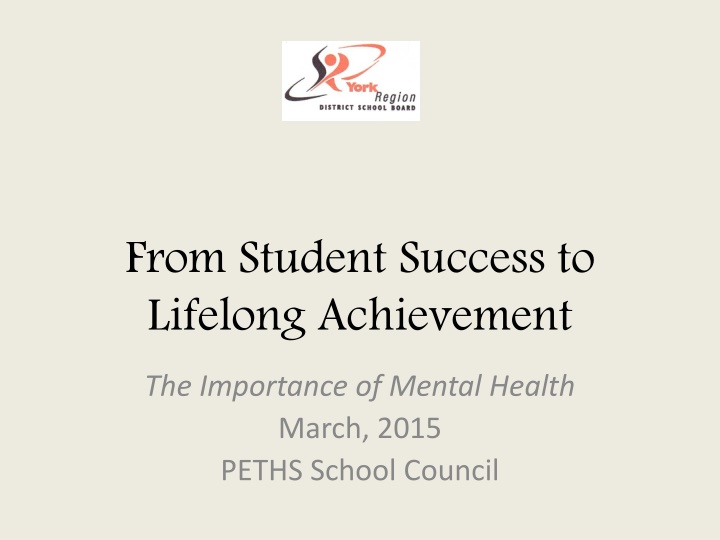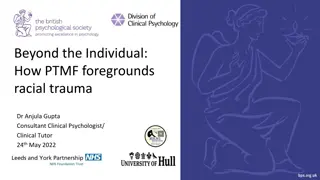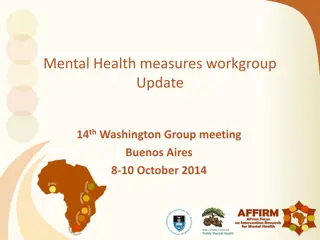The Critical Impact of Perfectionism on Mental Health and Achievement
Understanding the increasing prevalence of perfectionism among adolescents and its detrimental effects on mental health, this discussion explores how the pressure for perfection can lead to anxiety, depression, and even substance use, ultimately hindering lifelong achievement. Parents and educators are encouraged to foster a holistic approach to well-being and success, emphasizing self-acceptance, resilience, and emotional intelligence to prepare the younger generation for a fulfilling future.
Download Presentation

Please find below an Image/Link to download the presentation.
The content on the website is provided AS IS for your information and personal use only. It may not be sold, licensed, or shared on other websites without obtaining consent from the author.If you encounter any issues during the download, it is possible that the publisher has removed the file from their server.
You are allowed to download the files provided on this website for personal or commercial use, subject to the condition that they are used lawfully. All files are the property of their respective owners.
The content on the website is provided AS IS for your information and personal use only. It may not be sold, licensed, or shared on other websites without obtaining consent from the author.
E N D
Presentation Transcript
From Student Success to Lifelong Achievement The Importance of Mental Health March, 2015 PETHS School Council
Have we gotten it right? Does student success = livelong achievement?
Our Task as Parents and Educators To prepare our children/students to be: Ready for the post secondary and employment world Positive contributors to society Healthy and Thriving
Who we are and how we engage in the world are much stronger predictors of how our children will do than what we know about parenting. The question isn t are you parenting in the right way? It is Are you the adult you want your child to grow up to be? Brene Brown
The Relationship to Mental Health Wellbeing is not about absence of illness but about health and resiliency: Self regulation Self concept Self acceptance Connectedness/Belonging
Dangers of Perfectionism (Unbalanced Achievement Orientation) Students demonstrating perfectionism are at high risk for mental health challenges Anxiety Depression Suicidality in relation to perceived failure
Dangers of Perfectionism Anxiety is a necessary feature to support a perfectionist frame of reference Use of Substances to stay competitive (coffee stimulants cocaine )
A Culture of Perfectionism? Education phenomenon or Social phenomenon? Research suggests perfectionism is on the rise in adolescents. Flett and Hewitt (2014) concluded that 3 in 10 adolescents have some form of maladaptive perfectionism
Employers value Demonstrated Emotional Intelligence (EI) Skills and Knowledge Capacity for Creativity, Innovation (this requires risk taking!) Collaborative Capacity (danger of the solo artist)
Misconception Perfectionism is not a predictor of achievement Fear of failure, procrastination, and anxiety can all debilitate
When should I worry? High anxiety Hesitancy to move outside of the comfort zone Anxiety based procrastination Hyper-competitiveness All or Nothing Thinking Dysregulated affect: high distress for perceived failures
How to determine if perfectionism is a problem Is their performance drive or anxiety stopping them from doing things that they want to do? Is it interfering with friendships, school work, or family life? Is your child extremely distressed by feelings of failure, not being perfect? Do you feel that a need to be perfect is determining too many of your child's decisions? How long have you felt this way?
A bit about the brain Designed to keep our body in balance Our body craves homeostasis The brain supports adaptive functioning It is hardwired to protect us
Why is this important? Flight, Fight, or Freeze
A Helpful Brain Model for Families http://www.youtube.com/watch?v=DD-lfP1FBFk
Why is this important? Long term impacts of chronic stress Brain adapts to protect itself Patterns of responding can be maladaptive
The Threat of Unbalanced Achievement Orientation Relationship to identity All or nothing thinking Anxiety
If the day ever came when we were able to accept ourselves and our children exactly as we are and they are, then, I believe we would have come to an understanding of what "good parenting" means. Fred Rogers
Understanding Our Needs Foundations for Positive Mental Health
Neither comprehension or learning can take place in an atmosphere of anxiety. Rose Kennedy
The Significance of Safe Space To learn students need to feel safe. When students don t feel safe, the fight or flight center of the brain, the amygdala, fires and incapacitates the hippocampus, the new-learning center of the brain. Students then become survivors vs. learners (Nussbaum, 2012).
Connectedness and Belonging The energy that exists between people when they feel seen, heard, and valued; when they can give and receive without judgement; and when they derive sustenance and strength from the relationship. Brene Brown
Caring Relationships and Belonging Brain is hardwired for belonging and connection Survival instinct This is a pivotal mediator in identity development
The Marshmallow Test Revisited
What are our relationships with our children based on ? Expectation with acceptance Compassion Embracing failure as learning
Self Regulation: Putting on the Brakes We need our brain to have the alarm system, we wouldn t want to turn if off BUT higher level cortical functions help us moderate it Plasticity allows us to strengthen how the brain regulates
Responses to Stress: Mind-Body-Behaviour Relationship Mind (cognitive response): negative thoughts, attitudes and feelings Body (physiological response): physical symptoms and bodily reactions Behaviour (behavioural response): things you do to cope
Understanding the Triad MIND Thoughts/Feelings BRAIN/BODY Behaviors Physiology
Exercise You are sitting in your room at night reading. You hear a noise/knocking at the window .. Your first thought is ..
Exercise What was your thought? i.e. animal, branch, person/burglar What did you say to yourself? i.e. no big deal (branch) oh no, I ve got to get out of here (burglar) What feeling did your thoughts lead you to have? i.e. fear/dread (burglar) How would that feeling influence your behavior? i.e. run/hide/shake/tremble
Man can alter his life by altering his thoughts. William James
Neurons that fire together Wire together Where you focus attention stimulates certain parts of the brain We are wiring our pathways Let s learn how to control it CHOOSE to focus on the positive
Practice Letting Go http://www.youtube.com/watch?v=rSrSemQUe SI
Mind, Body, and Behavior Mindfulness Paying attention to the present Without judgement Without expectations Without fear Just accept it as it is . Let s practice
Strategies: Take up Smoking http://timewellness.files.wordpress.com/2011/11/deep-breathing.jpg?w=307 Just kidding! Why this works: Taking a break physically from place/environment which generates stress Deep breathing 3 breath hug Let s practice
Self Compassion Not about judging ourselves positively, but a way of relating to ourselves kindly, embracing ourselves lovingly flaws and all
Self Compassion The thing that is really hard, ,and really amazing, is giving up on being perfect and beginning the work of becoming yourself. Anna Quidlen http://www.self-compassion.org/ Treating yourself as you would a good friend
Are you ready to change the lens? http://www.ted.com/talks/shawn_achor_the_h appy_secret_to_better_work?language=en
The 21 day Challenge Daily: 1. Write down 3 new things you were grateful for that day 2. Journal one positive experience 3. Exercise 4. Meditation 5. One random act of kindness























